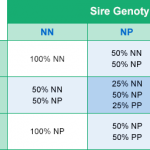PKD DNA Test for Cats
Only €60 with results in 12 working days
The Polycystic Kidney Disease PKD DNA Test is a fast and effective way of determining whether or not your cat has the mutated gene known to cause PKD or is likely to pass it on to any offspring.
![]()
What is Polycystic Kidney Disease?
Polycystic kidney disease or PKD is an inherited autosomal dominant disorder in Persian and Persian related cats that causes multiple cysts (pockets of fluid) to form on the kidneys. These cysts are present from birth. Initially they are very small, but they enlarge over time and may eventually disrupt kidney function resulting in kidney failure and possibly death.
All cats with PKD have cysts in their kidneys, but the number of cysts and the rate at which the cysts grow larger varies between cats. In most cats, the cysts grow slowly, and affected cats will not show any signs of kidney disease until later in life, usually around seven years old. In some cats, kidney failure will occur at a much younger age while kidney failure will not develop at all in other cats. There is currently no way of predicting how rapidly the disease will progress in a specific cat.
PKD is the result of a single, autosomal dominant gene abnormality. This means that every cat with the abnormal gene will have PKD. All cats with the PKD gene, even those with no clinical signs or only a few small cysts, will still pass the genetic defect onto its kittens, even if mated with an unaffected, healthy cat. In other words, a cat only needs one of its parents to be affected with PKD in order to inherit the abnormal gene and be affected itself.
![]()
Which Breeds Can Be Tested for PKD?
The PKD DNA Test can be carried out on Persians, Himalayans, Exotics and crosses of these three.
We can test cats of any age, but we recommend nursing kittens are separated from their mother for 30-45 minutes before swabbing otherwise they will have traces of the mother’s DNA in their mouths which may affect test results.
![]()
What will PKD DNA Test Results Tell You?
Using a simple swab from the inner cheek of your cat, we will ascertain whether your cat carries the mutated PKD1 gene.
We will email you a detailed DNA test report showing the cat’s genotype for PKD.
The 3 possible genotypes include:
- NN (2 copies of the normal allele)
- NP Heterozygote (1 normal copy and 1 copy of the PKD mutation)
- PP (2 copies of the PKD mutation)
PLEASE NOTE: the PKD DNA Test is not a breed test and will not provide information about a cat’s breed or genetic make-up.
![]()
How is PKD Inherited?
The following table shows the expected distribution of progeny genotypes based on a mating where both parents have known genotypes.
- N = Normal Allele
- P = PKD Mutation
- NN = 2 normal copies of the gene
- NP = 1 Normal copy, 1 copy of PKD mutation
- PP = 2 copies of the PKD mutation
Please click on the image below to view our PKD Inheritance Chart:
![]()
Other Cat DNA Tests from AffinityDNA
Learn more about your cat’s genetic similarity to different breed groups and breeds with the world’s most comprehensive, continuously updated cat breed analysis test.
Click here to read more about the Basepaws Cat DNA Test.
If you have any questions about the PKD DNA Test for Cats, please do not hesitate to Contact our Customer Service Team who will be happy to help you.



